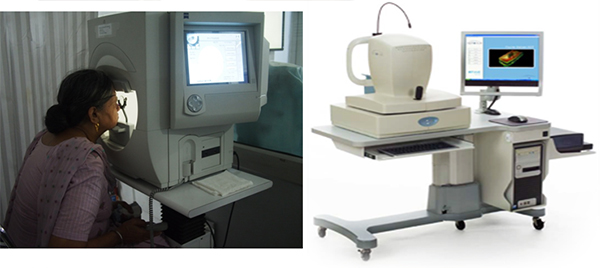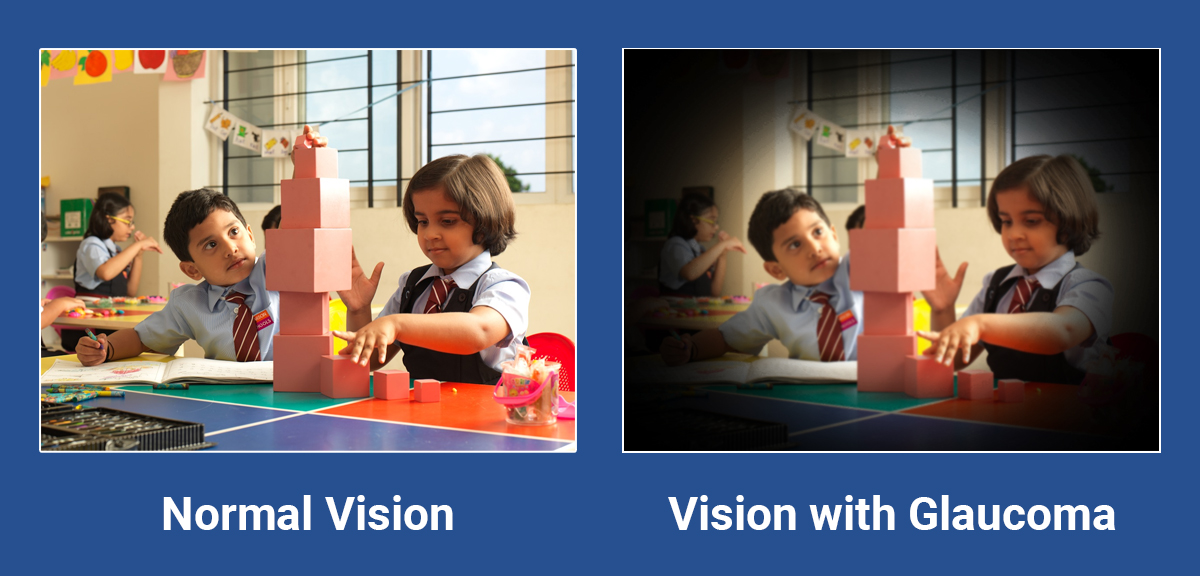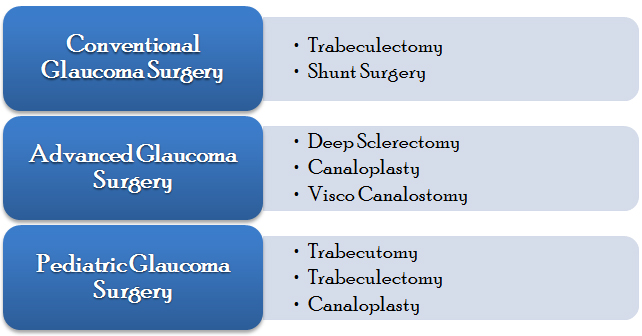We are dedicated to the care and treatment of people who have glaucoma. The hospital has the latest equipment for diagnoses and treatment of patients with glaucoma including the latest generation SPECTRAL DOMAIN OCT and HUMPHREY FIELD ANALYSER.

There are several types of glaucoma and its treatment depends on properly identifying precisely which kind is present. One factor common to most types of glaucoma is damage to the optic nerve of the eye due to pressure inside the eye. No matter whether the pressure is high, normal, or below normal, it can still cause damage. Some types of glaucoma are chronic and may be present for a lifetime. Other types of glaucoma are acute; that is, they occur suddenly.
All types of glaucoma need some form of treatment. Some people need surgery. Others may need medicine to treat the eye directly, or to treat some other health problem that is affecting the eye. Still others may need to have certain medicines stopped.
Appropriate treatment for glaucoma will prevent loss of sight in the majority of patients whose condition is detected early.

What is Glaucoma?
Glaucoma’ describes a whole group of diseases affecting the eye, but all share the common fact that they cause damage to the optic nerve of the eye. Because many different types of glaucoma exist, treatment depends upon the type of glaucoma as well as a variety of other factors.

Normally, watery fluid constantly flows through the eye. This fluid keeps the eye firm so the eyeball can function well visually. The amount of fluid entering the eye and the amount of fluid going out determine how firm the eye is. If the fluid outflow gets blocked the pressure inside the eye rises and causes damage.
The pressure within the eye, the intraocular pressure, can directly damage the optic nerve that joins the eye to the brain. Even when the intraocular pressure is not above average, it may still be high enough to cause optic nerve damage. Elevated intraocular pressure can damage other tissues as well, such as the cornea and the lens, and can squeeze out of the eye the blood needed to keep the nerves healthy, resulting in damage to the nerves or retina (the light-sensitive part of the eye).
Outflow of fluid, aqueous humor, can be blocked in different ways:
- The pupil, the hole through which the fluid flows as it passes from the back to the front of the iris (the colored part of the eye) can get blocked by adhesions or by a cataract.
- The sieve through which the fluid drains can become blocked by debris caused by inflammation, by deposits which are due to aging, by abnormal material which is sometimes the result of certain drugs, or by the iris itself.
- The veins into which the fluid flows when it leaves the eye can be partially blocked by other disease, or by pressure on the large veins in the orbit.
Average normal intraocular pressure in adults is 15 mm Hg (mercury). If the pressure is below 8 mm Hg or so, the eye may be too soft to function well. The actual upper limit of normal, however, is difficult to pinpoint.
If the pressure is consistently above 21 mm Hg, the chance of eye damage is probably around 10 percent. When the pressure inside the eye is above 26 mm Hg, the likelihood of eye damage increases to about 50 percent. When the intraocular pressure is above 30 mm Hg, the chance that damage will eventually develop may be close to 100 percent if the elevated pressure persists long enough.
What constitutes normal intraocular pressure is an individual matter for each person. For example, some persons with an intraocular pressure of 16 mm Hg may need surgery; others with a pressure of 30 mm Hg may not even need any treatment.
Symptoms of glaucoma
Glaucoma in most individuals remains symptomless till very late stages. In fact, most people with glaucoma will not know that there is anything wrong with their eyes till it is very advanced.
Some people may experience the following symptoms:
If you experience any of these symptoms you may be having an acute attack of glaucoma. Please consult a specialist urgently.
Investigations for Glaucoma
Patients of Glaucoma are investigates in some various modalities which include:
• Pachymetry
• Gonioscopy
• OCT
• Perimetry
Treatment of Glaucoma
Glaucoma Treatment involves medical and surgical management. In medical management, patients are prescribed eye drops which they need to use according to doctors instructions regularly. In surgical management, the conventional surgeries routinely performed are:

Advice for Patients with Glaucoma
- Follow the instructions of your doctor.
- Use the medicine as often as advised. If you are bothered by the medication in any way, contact your doctor immediately, but continue to use it until you have done so. Your physician will then tell you whether to stop the medicine or continue it.
- Using your medications exactly as ordered by your doctor is the best thing you can do to help keep your glaucoma under check even if you forget a single dose Be aware that your pressure may fluctuate and cause damage during that period.
- Wait at least three minutes between taking different types of drops.
- Make sure the drop goes into the eye. After taking the drops, keep the eye closed for 30 seconds.
- Return for your scheduled Re-examination yearly or six monthly. Most Glaucoma needs to be monitored regularly even if your pressure is controlled with medication. yearly or six monthly, Perimetry and Nerve Fiber Layer Examinations are a must for all glaucoma patients to ensure there is no progression.
- Concerns your Ophthalmologist at once if you have blurred vision associated with pain, if you see halos around lights, or if your eyes bother you any other way that concerns you
- Know what type of glaucoma you have. Some medication may make glaucoma worse, but this depends on the type of glaucoma. Most patients with open-angle chronic glaucoma can take any type of medicine without concern that it will alter control of the glaucoma. Any patient with glaucoma should notify their physician if they need to take steroids for long term.
- Encourage your relatives to have a medical eye examination. Glaucoma tends to affect more than one member of the family. Certain types of glaucoma may be hereditary. This is especially true for primary glaucomas. Therefore, your parents, brothers, sisters, aunts, uncles, cousins, and children should be examined.
- There are no specific lifestyle limitations. If you have glaucoma, it is probably not necessary for you to change your manner of living in any way. Excesses of most types are not conducive to good health.
- Exercise is important. Not only is exercise helpful for preservation of general health, it also can lower intraocular pressure. Being overweight can make glaucoma worse.


